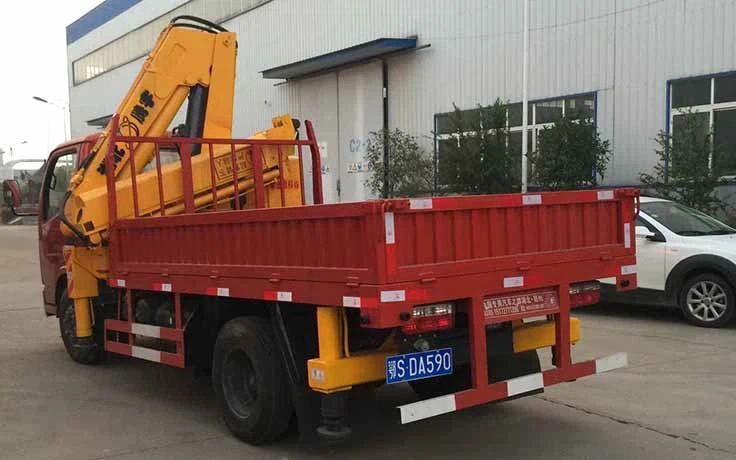Everything You Need to Know About a 2.5 Ton Truck

Introduction
When it comes to transportation, the choice of vehicle plays a crucial role in effectiveness and efficiency. Among the various sizes and types of trucks, the 2.5 ton truck stands out for its versatility and capability. This article will explore everything you need to know about 2.5 ton trucks, from specifications to common uses, advantages, and considerations for buying one. Whether you’re a homeowner needing to transport furniture or a business operator looking for reliable delivery options, this guide will provide insights to help you make informed decisions.
What is a 2.5 Ton Truck?
A 2.5 ton truck is classified based on its payload capacity, which is roughly 2,500 kilograms (or approximately 5,500 pounds). This truck is designed to handle a variety of loads, making it suitable for businesses as well as individual users. They often come with multiple configurations, including flatbeds, box trucks, and cargo vans, which add to their versatility.
Key Specifications
- Payload Capacity: 2,500 kg
- Gross Vehicle Weight (GVW): Typically around 3,500 to 5,000 kg
- Engine Size: Ranges from 2.5L to 3.5L depending on the model
- Fuel Type: Diesel or gasoline options available
- Transmission: Manual or automatic options
Types of 2.5 Ton Trucks
2.5 ton trucks come in various configurations to meet the needs of different users. Below are some of the most common types:
Box Trucks
Box trucks, also known as cube vans, have an enclosed cargo area that protects goods from the elements. They are ideal for transporting furniture, appliances, and other valuables.
Flatbed Trucks
Flatbed trucks have an open cargo area without sides or a roof. This design makes them perfect for transporting oversized items such as construction materials, machinery, and vehicles.
Cargo Vans
Cargo vans combine the features of a van with the carrying capacity of a truck. They are perfect for businesses that transport equipment, tools, or products.
Common Uses of 2.5 Ton Trucks
2.5 ton trucks are widely used across various sectors due to their adaptability. Here are some common uses:
Commercial Deliveries
Businesses often use 2.5 ton trucks for local deliveries, ranging from food distribution to retail products. Their size allows for maneuverability in urban settings.
Moving Services
These trucks are frequently utilized in moving services for residential and commercial relocations. They can accommodate furniture, appliances, and other household items efficiently.
Construction
In construction, 2.5 ton trucks are used to transport tools, equipment, and materials to job sites. Their robust build makes them suitable for rough terrains.
Event Management
Event organizers might employ 2.5 ton trucks to transport stage equipment, seating, and other supplies necessary for successful event execution.
Advantages of Using a 2.5 Ton Truck
There are several advantages to using a 2.5 ton truck, making them a popular choice among different user demographics.
Versatility

2.5 ton trucks can be used for various purposes, from personal transport to commercial delivery. This versatility allows users to adapt them to different needs.
Good Fuel Economy
Compared to larger trucks, 2.5 ton trucks typically deliver better fuel efficiency, enabling cost savings for businesses and individuals alike.
Ease of Driving
The size of a 2.5 ton truck makes it easier to drive and park than larger trucks, making them a favorable option in urban areas where space is limited.
Affordability
Generally, 2.5 ton trucks are more affordable both in terms of purchase price and maintenance costs, making them attractive for small businesses and startups.
Buying a 2.5 Ton Truck: Key Considerations
When considering a 2.5 ton truck purchase, there are several factors to keep in mind to ensure you make the right choice.
New vs. Used
Decide whether to buy a new truck or a used one. New trucks come with warranties and the latest technology, while used trucks can save you money. Evaluate your budget and needs carefully.
Truck Configuration
Consider what type of cargo you will be transporting. This can dictate whether you need a box truck, flatbed, or cargo van configuration.
Engine Type
Choose between diesel and gasoline engines. Diesel engines often provide better torque and fuel efficiency, while gasoline engines may offer lower upfront costs.
Maintenance and Reliability
Research the truck model you are interested in for reliability and maintenance statistics. Some brands are known for longevity and low maintenance costs.
Maintenance Tips for 2.5 Ton Trucks
Proper maintenance ensures a 2.5 ton truck operates efficiently and lasts longer. Here are some essential maintenance tips:
Regular Oil Changes
Change the oil regularly according to the manufacturer’s recommendations to keep the engine running smoothly.
Tire Maintenance
Regularly check tire pressure and tread wear. Replace tires when needed to ensure safety and efficiency.
Brake Checks
Inspect brake systems frequently. Address any issues immediately to prevent more severe problems down the line.
Annual Inspections
Schedule annual inspections to meet local regulations and ensure all parts of the truck are functioning correctly.
Practical Examples of 2.5 Ton Trucks In Action
Understanding how 2.5 ton trucks are used in real-life scenarios can provide valuable insights.
Example 1: Local Delivery Services
A local bakery uses a 2.5 ton box truck to deliver fresh goods to restaurants and grocery stores. The truck’s capacity allows it to transport multiple orders at once, making deliveries more efficient.
Example 2: Moving Companies
A moving company utilizes a 2.5 ton truck to help customers relocate. The truck accommodates furniture and boxes easily, saving time and labor during moves.
Example 3: Construction Sites
A construction firm employs a flatbed 2.5 ton truck to transport supplies to job sites. It carries building materials such as lumber and concrete blocks, making it an essential part of their operations.
Frequently Asked Questions (FAQ)
1. How much can a 2.5 ton truck carry?
A 2.5 ton truck can typically carry a payload of around 2,500 kg (approximately 5,500 pounds), depending on the truck’s specific model and configuration.
2. Is a 2.5 ton truck easy to drive?
Yes, compared to larger trucks, a 2.5 ton truck is easier to drive and maneuver, making it suitable for urban environments.
3. How can I tell if a used 2.5 ton truck is reliable?

Research the truck’s maintenance history, vehicle history report, and customer reviews. Additionally, have a trusted mechanic inspect it before purchasing.
4. What is the average cost of a 2.5 ton truck?
The cost varies widely depending on the make, model, year, and condition, but prices generally range from $20,000 to $50,000 for new models and lower for used options.
5. Do I need a special license to drive a 2.5 ton truck?
Generally, a standard driver’s license is sufficient to drive a 2.5 ton truck. However, local regulations may vary, so it’s essential to check your region’s requirements.

6. Can I use a 2.5 ton truck for personal moving?
Absolutely! 2.5 ton trucks are great for personal moves, as they have enough space for multiple boxes and larger furniture pieces.
